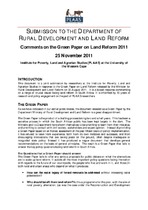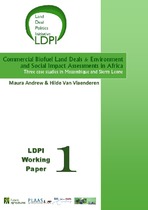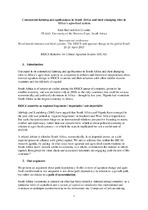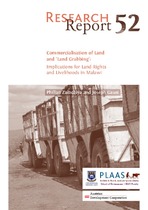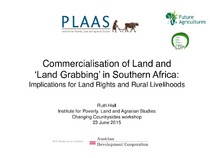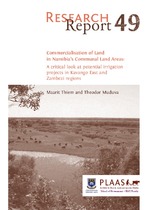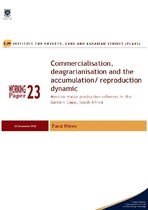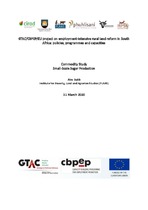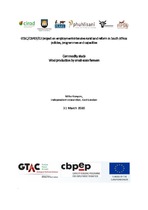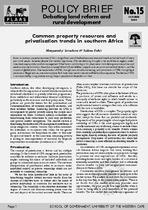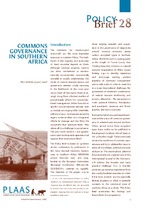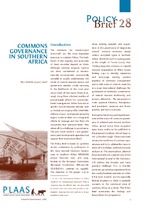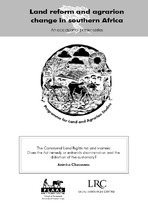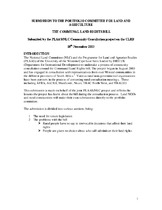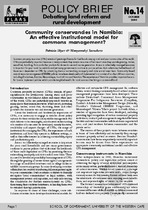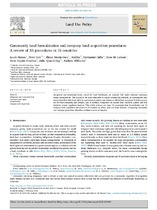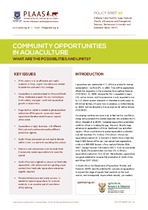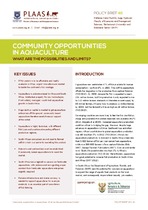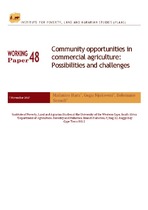Browsing Institute for Poverty, Land and Agrarian Studies (PLAAS) by Title
Now showing items 89-108 of 608
-
Comments on the green paper on land reform 2011
(Institute for Poverty Land and Agrarian Studies (PLAAS), 2011)This document is a joint submission by researchers at the Institute for Poverty, Land and Agrarian Studies in response to the Green Paper on Land Reform released by the Minister for Rural Development and Land Reform on 30 ... -
Comments on the Green Paper on land reform 2011
(Institute for Poverty, Land and Agrarian Studies, University of the Western Cape, 2011)As we have indicated in our earlier press release, the document released as a Green Paper by the Department Ministry of Rural Development and Land Reform is a great disappointment. The Green Paper is the product of a ... -
Commercial biofuel land deals & environment and social impact assessments in Africa: Three case studies in Mozambique and Sierra Leone
(Institute for Poverty, Land and Agrarian Studies, University of the Western Cape, 2011)The rapid increase in attempts by foreign investors to acquire large tracts of land in Africa for biofuel developments has generated substantial concern about their potential negative impact on the communities living in ... -
Commercial farming and agribusiness in South Africa and their changing roles in Africa’s agro-food system
(Institute for Poverty Land and Agrarian Studies (PLAAS), 2015)Our paper is on commercial farming and agribusiness in South Africa and their changing roles in Africa’s agro-food system, as a response to debates and theoretical propositions about internal agrarian change in BRICS ... -
Commercialisation of land and ‘Land Grabbing': Implications for Land Rights and livelihoods in Malawi
(Institute for Poverty, Land and Agrarian Studies, University of the Western Cape, 2015)This study investigates the processes and impact of commercialisation of land in Malawi – specifically the acquisition of huge tracts of communal lands by foreign companies and local elites for sugarcane production in ... -
Commercialisation of land and ‘land grabbing’ in Southern Africa: Implications for land rights and rural livelihoods
(2015)This project is conceived as a response to widespread concerns about the ‘land grab’ phenomenon in sub-Saharan Africa, and the dearth of grounded studies to understand how these deals are structured, who facilitates them, ... -
Commercialisation of land in Namibia’s communal land areas: A critical look at potential irrigation projects in Kavango East and Zambezi regions
(Institute for Poverty, Land and Agrarian Studies, University of the Western Cape, 2015)Large-scale land acquisitions by both foreign and local investors for agriculture, forestry and wildlife purposes, among others, remain a major challenge for African governments. In recent years, the Namibian ... -
Commercialisation, deagrarianisation and the accumulation/reproduction dynamic: Massive maize production schemes in the Eastern Cape, South Africa
(Institute for Poverty, Land and Agrarian Studies, University of the Western Cape, 2012-12)The post-apartheid era has seen the South African government trying to reverse ‘deagrarianisation’ in the former homelands by introducing ‘modern’ farming techniques and agribusiness principles. This paper situates the ... -
Commodity Study: Small-Scale Sugar Production
(GTAC, 2020-03-31)The South African sugar industry has long been one of South Africa’s most substantial agro-industries. The South African Sugar Association (SASA) estimates that around R16bn in value is annually created by 85,000 directly ... -
Commodity study: Wool production by small-scale farmers
(GTAC, 2020-03-31)Small-scale wool production, especially in former bantustan areas, has the potential for significant expansion and ongoing and successful farmer support should be expanded. The small proportion of sheep and wool farmers ... -
Common property resources and privatisation trends in Southern Africa
(Institute for Poverty, Land and Agrarian Studies, University of the Western Cape, 2004)Access to common property resources (CPRs) is a significant part of the land resource base and therefore the livelihoods of many poor rural people. However, despite their central importance, CPRs are declining throughout ... -
Commons Governanace in South Africa
(Institute for Poverty, Land and Agrarian Studies, University of the Western Cape, 2009)The commons (or common-pool resources)1 are the most important resources in southern Africa. The livelihoods of the majority and economies of most countries depend on them. Although common property regimes are often ... -
Commons governance in Southern Africa
(PLAAS, University of the Western Cape, 2009-06-28)This Policy Brief is based on synthetic studies undertaken by participants in the Cross Sectoral Commons Governance in Southern Africa (CROSCOG) project between 2007 and 2009, funded by the European Commission (European ... -
The Communal Land Rights Act and women: Does the Act remedy or entrench discrimination and the distortion of the customary?
(Institute for Poverty Land and Agrarian Studies (PLAAS), 2005)This paper discusses the likely impact of the Communal Land Rights Act (CLRA) of 2004 on the land rights of rural women. It asks whether the Act is likely to enhance or undermine tenure security, not only for women, but ... -
The Communal Land Rights Bill
(Institute for Poverty, Land and Agrarian Studies, University of the Western Cape, 2003)Tenure legislation is urgently necessary. There are serious problem in the communal areas in the ex-homeland provinces. These areas are characterised by severe poverty, overcrowding and isolation from economic growth and ... -
Community conservancies in Namibia: An effective institutional model for commons management?
(Institute for Poverty, Land and Agrarian Studies, University of the Western Cape, 2004)Common property resources (CPRs) remain of great significance for livelihoods among rural and poor communities of the world. CPRs are particularly important because in many contexts they remain resources of last resort ... -
Community land formalization and company land acquisition procedures: A review of 33 procedures in 15 countries
(Elsevier, 2020)Indigenous and community lands, crucial for rural livelihoods, are typically held under informal customary tenure arrangements. This can leave the land vulnerable to outside commercial interests, so communities may seek ... -
Community opportunities in aquaculture, What are the possibilities and limits?
(Institute for Poverty, Land and Agrarian Studies, University of the Western Cape, 2016)Aquaculture now contributes 47% of fish available for human consumption – up from 9% in 1980. This shift to aquaculture offsets the stagnation in the production from capture fisheries (FAO 2012). By 2030, demand for ... -
Community opportunities in aquaculture: what are the possibilities and limits?
(Institute for Poverty, Land and Agrarian Studies, University of the Western Cape, 2016)Aquaculture now contributes 47% of fish available for human consumption – up from 9% in 1980. This shift to aquaculture offsets the stagnation in the production from capture fisheries (FAO 2012). By 2030, demand for ... -
Community opportunities in commercial agriculture: Possibilities and challenges
(Institute for Poverty, Land and Agrarian Studies, University of the Western Cape, 2017-11)Aquaculture has potential to contribute towards food and nutrition security, job creation and income for South African communities, provided that the challenges and limitations for their participation in commercial ...

